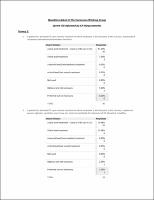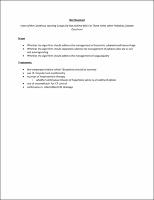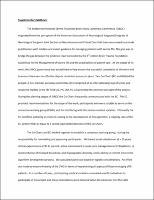| dc.contributor | Vall d'Hebron Barcelona Hospital Campus |
| dc.contributor.author | Aguilera, Sergio |
| dc.contributor.author | Bulger, Eileen |
| dc.contributor.author | Cooper, D. Jamie |
| dc.contributor.author | Sahuquillo Barris, Joan |
| dc.contributor.author | Hawryluk, Gregory WJ |
| dc.contributor.author | Buki, Andras |
| dc.contributor.author | Citerio, Giuseppe |
| dc.date.accessioned | 2020-09-02T07:44:53Z |
| dc.date.available | 2020-09-02T07:44:53Z |
| dc.date.issued | 2019-10-28 |
| dc.identifier.citation | Hawryluk GWJ, Aguilera S, Buki A, Bulger E, Citerio G, Cooper DJ, et al. A management algorithm for patients with intracranial pressure monitoring: the Seattle International Severe Traumatic Brain Injury Consensus Conference (SIBICC). Intensive Care Med. 2019 Oct 28;45(12): 1783–94. |
| dc.identifier.issn | 0342-4642 |
| dc.identifier.uri | https://hdl.handle.net/11351/5202 |
| dc.description | Brain injury; Head trauma; Algorithm |
| dc.description.abstract | Background: Management algorithms for adult severe traumatic brain injury (sTBI) were omitted in later editions of the Brain Trauma Foundation’s sTBI Management Guidelines, as they were not evidence-based. Methods: We used a Delphi-method-based consensus approach to address management of sTBI patients undergoing intracranial pressure (ICP) monitoring. Forty-two experienced, clinically active sTBI specialists from six continents comprised the panel. Eight surveys iterated queries and comments. An in-person meeting included whole- and small-group discussions and blinded voting. Consensus required 80% agreement. We developed heatmaps based on a traffic-light model where panelists’ decision tendencies were the focus of recommendations. Results: We provide comprehensive algorithms for ICP-monitor-based adult sTBI management. Consensus established 18 interventions as fundamental and ten treatments not to be used. We provide a three-tier algorithm for treating elevated ICP. Treatments within a tier are considered empirically equivalent. Higher tiers involve higher risk therapies. Tiers 1, 2, and 3 include 10, 4, and 3 interventions, respectively. We include inter-tier considerations, and recommendations for critical neuroworsening to assist the recognition and treatment of declining patients. Novel elements include guidance for autoregulation-based ICP treatment based on MAP Challenge results, and two heatmaps to guide (1) ICP-monitor removal and (2) consideration of sedation holidays for neurological examination. Conclusions: Our modern and comprehensive sTBI-management protocol is designed to assist clinicians managing sTBI patients monitored with ICP-monitors alone. Consensus-based (class III evidence), it provides management recommendations based on combined expert opinion. It reflects neither a standard-of-care nor a substitute for thoughtful individualized management. |
| dc.language.iso | eng |
| dc.publisher | Springer Nature |
| dc.relation.ispartofseries | Intensive Care Medicine;45(12) |
| dc.rights | Attribution-NonCommercial 4.0 International |
| dc.rights.uri | http://creativecommons.org/licenses/by-nc/4.0/ |
| dc.source | Scientia |
| dc.subject | Cervell - Ferides i lesions |
| dc.subject | Pressió intracranial |
| dc.subject | Equips d'especialistes |
| dc.subject.mesh | Brain Injuries, Traumatic |
| dc.subject.mesh | Intracranial Pressure |
| dc.subject.mesh | Delphi Technique |
| dc.title | A management algorithm for patients with intracranial pressure monitoring: the Seattle International Severe Traumatic Brain Injury Consensus Conference (SIBICC) |
| dc.type | info:eu-repo/semantics/article |
| dc.identifier.doi | 10.1007/s00134-019-05805-9 |
| dc.subject.decs | lesiones encefálicas traumáticas |
| dc.subject.decs | presión intracraneal |
| dc.subject.decs | técnica Delfos |
| dc.relation.publishversion | https://link.springer.com/article/10.1007%2Fs00134-019-05805-9 |
| dc.type.version | info:eu-repo/semantics/publishedVersion |
| dc.audience | Professionals |
| dc.contributor.authoraffiliation | [Hawryluk GWJ] Section of Neurosurgery, University of Manitoba, Winnipeg, Canada. [Aguilera S] Almirante Nef Naval Hospital, Valparaiso University, Viña Del Mar, Chile. Valparaiso University, Valparaiso, Chile. [Buki A] Department of Neurosurgery, Medical School and Szentágothai Research Centre, Ifjúság Útja, Pécs, Hungary. University of Pécs, Pécs, Hungary. [Bulger E] Department of Surgery, Harborview Medical Center, University of Washington, Seattle, USA. [Citerio G] School of Medicine and Surgery, University of Milan-Bicocca, Milan, Italy. Anaesthesia and Intensive Care, San Gerardo and Desio Hospitals, ASST-Monza, Monza, Italy. [Cooper DJ] Intensive Care Medicine, Australian and New Zealand Intensive Care Research Centre, Monash University, Melbourne, Australia. Department of Intensive Care and Hyperbaric Medicine, The Alfred Hospital, Melbourne, Australia. [Sahuquillo J] Servei de Neurocirurgia, Vall d'Hebron Hospital Universitari, Barcelona, Spain |
| dc.identifier.pmid | 31659383 |
| dc.identifier.wos | 000492941700002 |
| dc.rights.accessrights | info:eu-repo/semantics/openAccess |





